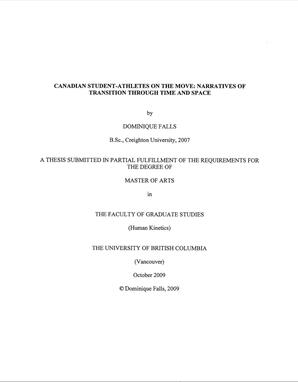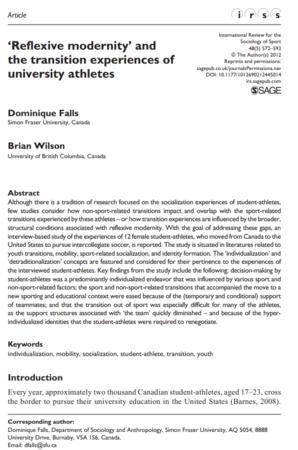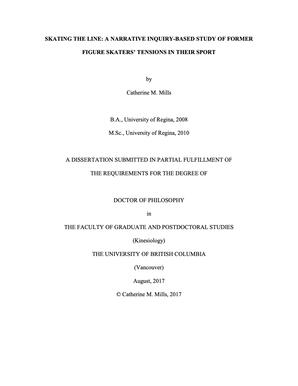Wilson, Brian
Person Preferred Name
Brian Wilson
Related Works
Content type
Digital Document
Abstract
Every year, approximately two thousand Canadian student-athletes, aged 17-23, cross the border to pursue their university education in the United States (Barnes, 2008). However, there is a scarcity of in-depth research that considers the experiences of these athletes. More pertinently, little is known about how student-athlete movement can be understood in relation to research on ‘detraditionalization’ and ‘individualization’ which suggests that the influence of traditional ties (e.g. class, gender, ethnicity) on young people’s experiences and identities is diminishing. With these concerns in mind a study was designed that explored the following two research questions: 1) how might processes of detraditionalization and individualization inform an understanding of the transition experiences of female Canadian student-athletes moving to the United States for their university education?; 2) how are female Canadian student-athletes’ experiences and identities shaped by the transitions they are faced with in their move to and time spent in the United States? To pursue these questions, in-depth interviews were conducted with 12 Canadian female student-athletes who pursued their education at and graduated from a United States’ university. Key findings included: the women’s decisions to attend college were influenced by an interrelated set of sport-related factors (e.g. a desire to pursue sport at the ‘highest level’) and non-sport factors (e.g. to break free from the familiarity of home); transition experiences were complex and context dependent and were also influenced by sport-related factors (e.g. relationships with the coach and teammates) and non-sport factors (e.g. degree of culture shock). The research also showed that the women used diverse strategies to deal with their disconnection from home (e.g. use of various communication technologies) and that negative experiences were commonly reframed in positive terms. In sum, the women experienced processes of individualization and detraditionalization but the structure of the sports team provided some of the stabilizing influences thought to be diminishing in the contemporary moment. This thesis concludes with a discussion of ways that these findings could be useful for athletes who are experiencing various forms of transition, and the coaches, peers, parents, and others who are attempting to support them.
Origin Information
Content type
Digital Document
Abstract
Although there is a tradition of research focused on the socialization experiences of student-athletes, few studies consider how non-sport-related transitions impact and overlap with the sport-related transitions experienced by these athletes – or how transition experiences are influenced by the broader, structural conditions associated with reflexive modernity. With the goal of addressing these gaps, an interview-based study of the experiences of 12 female student-athletes, who moved from Canada to the United States to pursue intercollegiate soccer, is reported. The study is situated in literatures related to youth transitions, mobility, sport-related socialization, and identity formation. The ‘individualization’ and ‘detraditionalization’ concepts are featured and considered for their pertinence to the experiences of the interviewed student-athletes. Key findings from the study include the following: decision-making by student-athletes was a predominantly individualized endeavor that was influenced by various sport and non-sport-related factors; the sport and non-sport-related transitions that accompanied the move to a new sporting and educational context were eased because of the (temporary and conditional) support of teammates; and that the transition out of sport was especially difficult for many of the athletes, as the support structures associated with ‘the team’ quickly diminished – and because of the hyper- individualized identities that the student-athletes were required to renegotiate.
Origin Information
Content type
Digital Document
Abstract
Figure skaters skate a fine line as they navigate pressures to execute physically demanding, technical skills while maintaining the aesthetics of movements, appearance, and musicality. These conditions along with embedded narratives of success and performance affect the experiences of every competitive figure skater. As a former figure skater and coach, in this research, I explore the experiences of figure skaters and the inherent tensions they endure (Clandinin, Murphy, Huber, & Orr, 2009). Integrating theories and methods from organizational culture and narrative inquiry, my research explores the experiences of athletes within the culture of high-performance figure skating. I recruited seven former figure skaters (four female and three male) who had competed at a Senior Competitive level in Canada. The research followed three guiding questions: • What tensions do former figure skaters identify in relation to their experience as high-performance figure skaters? • How are these tensions related to the organizational culture of figure skating? • How do participants reflect on these tensions over time? Using artifacts to elicit conversations and reflections, I completed three to four interviews with each participant. I present their stories in a variety of narrative formats to better capture the feel of the interviews and their lived experiences. The figure skaters experienced multiple tensions across their careers as they embraced the lifestyle of a skater and during transitions away from the sport. Tensions included monitoring bodies, an overriding emphasis on competitions and winning, and the importance of music, choreography, and appearance in their overall performance as elite figure skaters. While many tensions were taken-for-granted as being a high-performance athlete, once removed from the sport, participants became aware of the sacrifices they had made and how some aspects of the culture had influenced their mental health and well-being. A critical analysis of the normalized aspects of the sport revealed an emphasis on performance deeply embedded across all levels of figure skating’s organizational culture (Schein, 2010). The dissertation highlights how participants became part of the problematic culture, accepting its localized terms and conditions which in turn served to reinforce and re-create the culture’s dominant values and norms (Alvesson, 2013; Smircich, 1983).
Origin Information



